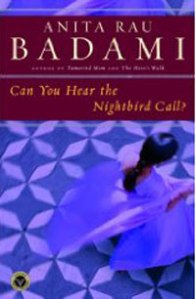 I read Anita Rau Badami’s Can You Hear the Nightbird Call? for a course that I am TAing. I was not sure what to expect, but found myself blown away by Badami’s writing. The material is very explosive and she nimbly moves across three different characters and narratives to weave together an amazing story about violence, displacement, immigration, and trauma. The novel, set in India after partition and Vancouver, deals with the fallout from the British carving up of the subcontinent into a Muslim majority Pakistan and a Hindu majority India. The problem with these rather arbitrary lines is that they left Sikhs, Muslims, and Hindus in many areas without a home and massive amounts of violence ensued. Badami’s novel is particularly interested in the plight of Punjab, a rich fertile region that had a strong sense of identity before conquest by British imperial forces in the mid 19th century. It has since been divided up between various countries and turned into a bloody battleground. The novel also takes up the Sikh fight for a homeland against Indira Ghandi’s India, culminating in the Air India bombing of 1985.
I read Anita Rau Badami’s Can You Hear the Nightbird Call? for a course that I am TAing. I was not sure what to expect, but found myself blown away by Badami’s writing. The material is very explosive and she nimbly moves across three different characters and narratives to weave together an amazing story about violence, displacement, immigration, and trauma. The novel, set in India after partition and Vancouver, deals with the fallout from the British carving up of the subcontinent into a Muslim majority Pakistan and a Hindu majority India. The problem with these rather arbitrary lines is that they left Sikhs, Muslims, and Hindus in many areas without a home and massive amounts of violence ensued. Badami’s novel is particularly interested in the plight of Punjab, a rich fertile region that had a strong sense of identity before conquest by British imperial forces in the mid 19th century. It has since been divided up between various countries and turned into a bloody battleground. The novel also takes up the Sikh fight for a homeland against Indira Ghandi’s India, culminating in the Air India bombing of 1985.
Part of my amazement stems from Badami’s ability to keep the narrative engaging despite the heaviness of the material that she is dealing with. It can be easy to be overwhelmed by historical atrocity, yet Badami does not allow this happen even as she gives a few shocking moments that are quite hard to read.There is a humanity to the novel that is enjoyable yet also extremely plausible. The three main characters – Bibi-ji, a Sikh woman who stole her sister’s husband, Leela, an educated Hindu woman who escapes Bangalore by marrying Balu, a chemistry professor who is working in Canada, and Nimmo, a Sikh woman who may or may not be Bibi-ji’s niece – are textured and complicated. I felt myself completely drawn into their world and the tensions they experience.
At the same time, I am not quite sure what to do with the novel as Canada appears in a far from illustrious light. I have my own conflicted relationship with the country, but the history that Badami narrates puts paid to the sense that multiculturalism is anything but a kind of benign racist indifference. The Air India bombing of 1985 in which all 329 people on board the plane were killed, including 268 Canadians, making it, in the words of Stephen Harper, the worst mass murder in Canadian history. Of course, Harper`s words came in 2010, 25 after the bombing. This is the problem. It took nearly 20 years for Canadian officials to recognize the bombing as a Canadian tragedy! Brian Mulrooney, Prime Minister in 1985, actually called the Indian prime minister to send his condolences despite the fact that the people on the plane were primarily Canadian citizens. For reasons that are highly suspect, Mulrooney and his aides saw the victims as Indian despite their Canadian passport. And here`s where multiculturalism loses much of its lustre: for although it recognizes other (non-white) cultures as valuable, they are always only other cultures, or not Canadian. Although it is easy to condemn the Sikh bombers of Air India Flight 182, Can You Hear the Nightbird Call? makes an easy condemnation much more difficult as it details the long and complicated history of violence between Sikhs, Muslims, and Hindus in India. This violence also traveled into Canada as the bombers were Canadian, asking questions about how CSIS, the RCMP, and the Canadian government were caught so unaware.
I highly recommend this book for fans of Canadian literature because it asks difficult questions of Canada.
Badami, Anita Rau. Can You Hear the Nightbird Call? Toronto: Vintage Canada, 2007. Print.